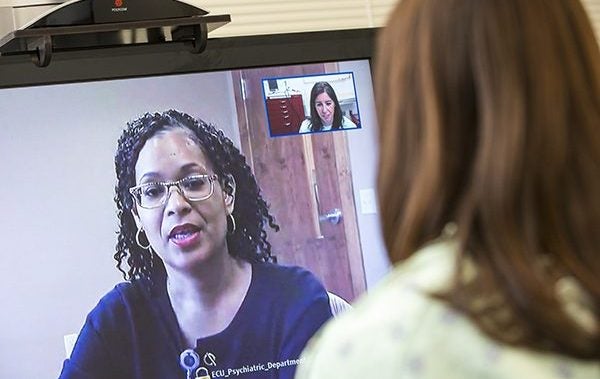MENTAL HEALTH EXPANSION
$1.2 million federal grant to expand statewide telepsychiatry services

A grant from the Health Resources and Services Administration will enable an ECU team of psychiatrists to expand telehealth services to more rural North Carolina communities. (Photo by Cliff Hollis)
An East Carolina University team in the Brody School of Medicine’s Department of Psychiatry and Behavioral Medicine has received a $1.2 million federal grant to expand telehealth-based mental health services in North Carolina.
The grant from the Health Resources and Services Administration (HRSA) will support a project titled, “Enhancing Access, Quality and Outcomes of Mental Health Care in Emergency Departments: Expansion of the NC Statewide Telepsychiatry Program.” The project is a collaboration between ECU’s Departments of Psychiatry and Family Medicine, along with several community-based sites across the state.
“This project follows the tradition of ECU and the Brody School of Medicine of serving those who otherwise would not be served. Projects of this caliber allow us to make a difference in the lives of people not only in eastern North Carolina but across the entire state,” said Dr. Kalyan Muppavarapu, principal investigator and clinical assistant professor in the Department of Psychiatry and Behavioral Medicine.
The North Carolina Statewide Telepsychiatry Program (NC-STeP) is based at ECU and directed by Dr. Sy Saeed, professor and chair of Brody’s Department of Psychiatry and Behavioral Medicine. Established through state legislation in 2013 with $2 million in annual funding, NC-STeP is administered by the ECU Center for Telepsychiatry and E-Behavioral Health and is overseen by the Department of Health and Human Services’ Office of Rural Health.

Dr. Kalyan Muppavarapu (Contributed)

Dr. Sy Saeed (Contributed)
The grant award is particularly timely because of the national call from mental health experts for preparation for the increased need for mental health services in wake of the COVID-19 pandemic. Resources were already stretched before the pandemic, a problem for which NC-STeP has provided consistent evidence-based solutions for the state.
“COVID-19 created significant challenges for patient access to care while highlighting the vulnerabilities in our current health-care system as well as the importance of using technology in reaching our patients,” Muppavarapu said. “New care delivery models have been and continue to be developed and explored; telehealth plays a significant role in removing the barriers and obstacles that have plagued rural health care for many years.”
Ninety of North Carolina’s 100 counties are designated mental health professional shortage areas, with increasing dependence on emergency rooms for acute mental health crises. NC-STeP helped establish a lifeline of telepsychiatry services by connecting rural emergency departments using videoconferencing to provide help and diminish unnecessary patient admissions to hospitals.
NC-STeP currently serves 58 emergency departments and eight community clinics. NC-STeP providers have completed more than 40,000 patient encounters via telehealth, resulting in substantial savings for the state.
The grant project aims to build on that success. The project’s over-arching objectives are to:
- expand the existing NC-STeP network to include behavioral counseling and care coordination in at least five rural hospital sites;
- to establish and implement counseling and care protocols for acute behavioral health needs and post-discharge follow-up care; and
- to explore innovative wireless telehealth access to behavioral counseling in a mobile outreach van, as a model for pre-hospital and in-route assessment and counseling and for an expanded electronic health records portal.
“This project will allow us to expand our services by embedding behavioral health counseling as well as care coordination,” Muppavarapu said. “This is a natural next step for our program as we look to build off the initial success of NC-STeP. This project connects community resources to patients who otherwise may not receive follow-up care after discharge from the emergency department.”
The expansion has potential to impact patients from children to adults, taking the program a step further into the critical transition phase following discharge from the emergency department—reducing the risk for hospital re-admission.
The project will expand access to behavioral counseling and care coordination for rural, underserved and impoverished North Carolinians, linking an estimated 600 at-risk adults and children with mental health resources. The grant will also support a planned pilot test of telehealth-based behavioral counseling services via mobile van outreach program in remote areas.
“This project provides a learning opportunity and can serve as a model to implement telehealth strategies in other health-care specialties which could have a positive impact on the health and well-being of the rural patient population,” Muppavarapu said.
NC-STeP, leaders earn honors
The North Carolina Statewide Telepsychiatry Program (NC-STeP) and its leadership have earned recent regional and national accolades.
Dr. Sy Saeed, professor and chair of the ECU Brody School of Medicine’s Department of Psychiatry and Behavioral Medicine, was recently appointed to the American Board of Telehealth, national entity designed to develop best practices and standards for telehealth education. Saeed joins seven other national telehealth experts—“some of the biggest names on the national telehealth stage,” according to a press release announcing the news.
The board was created by Avera Health, a South Dakota-based health network focusing on improving and ensuring the quality of telehealth by developing high-quality, evidence-based education in the practice, to mark the expansion of a telehealth certificate program.
Saeed has long served as a consultant and national advisor to other institutions considering telepsychiatry programs, including in several other states. For that work and leading NC-STeP to tangible results in North Carolina, Saeed was the 2019 recipient of the O. Max Gardner Award. That honor pays tribute to one faculty member within the UNC System who makes significant contributions to the welfare of the human race.
Saeed has also been vocal on the importance of telepsychiatry during and after the pandemic.
In April, he presented an outline to the North Carolina General Assembly’s House Select Committee Health Care Working Group on preparing to respond to mental health needs post-pandemic.
“Mental health and substance use disorders are common,” Saeed said, “but services have been in short supply even before the COVID-19 pandemic.”
This summer, the NC-STeP program received a 2020 Breaking Barriers Through Telehealth Award from the Mid-Atlantic Telehealth Resource Center (MATRC), a member of the National Consortium of Telehealth Resource Centers.
The award highlights the program’s commitment to providing mental health care for patients with acute behavioral health crises who present in hospital emergency departments across the state. The program has achieved a return on investment of more than $30 million by preventing unnecessary hospitalizations.
NC-STeP was selected from a pool of nominees from MATRC’s region that includes North Carolina, Delaware, Washington, D.C., Kentucky, Maryland, New Jersey, Pennsylvania, Virginia and West Virginia.

Telepsychiatry connects patients who report to emergency departments for immediate mental health care with providers who can assess their needs and avoid unnecessary hospitalizations. (Photo by Cliff Hollis)
